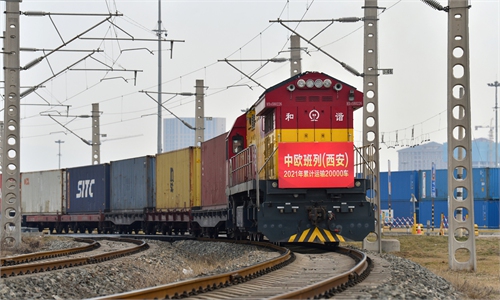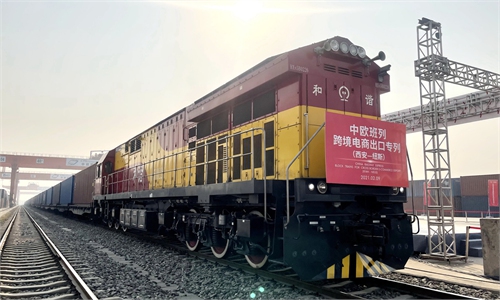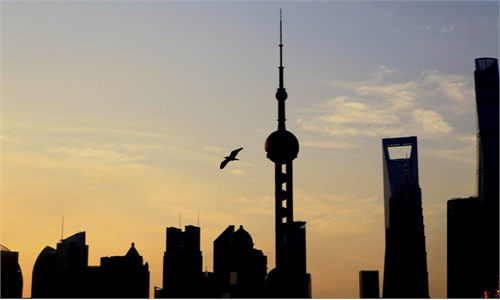New trend brings vast opportunities for countries to cooperate with China in post-pandemic era: analysts
Hope for new round of ‘going overseas’ opens door for more partnership

A Chinese staff from CNPC Greatwall Drilling Company and a Cuban staff exchange greetings at the company's GW91 drilling project in Cuba on November 27, 2020. Photo: Xinhua
As the pandemic situation in China was brought under control, the number of overseas business activities of Chinese firms has witnessed an increasing trend as companies from different sectors including Hisense, Midea and Sinopec have struck new deals with overseas partners.
This could herald a new round of going global for Chinese companies with the likely relaxing of border restrictions as vaccinations are taking place in many countries, which offers vast opportunities for more countries to cooperate with China - the only major economy to record a positive economic growth in 2020, economists said.
On March 1, Hisense, a Shandong Province based home appliance supplier, reached a 1.3 billion yuan ($200 million) merger and acquisition deal with Japan-based SANDEN to purchase 75 percent of the latter's vote, which makes compressors for air conditioners, marking a further step for the company's going global strategy, the company told the Global Times.
On the same day, another Chinese home appliance maker Midea concluded a deal with a Hitachi Global Life Solutions' factory in Thailand changing the factory's name to GMSS and Welling Appliance Component - the first overseas base of Midea's electromechanical department.
Vast opportunities
In addition to activities from private sector, Chinese state-owned companies are also making progress in overseas markets.
On Friday, Sinopec Engineering, a subsidiary of Sinopec signed a $942 million deal with Russia to provide project services - the company's largest overseas single-unit deal.
"With China's successful handling of the COVID-19 pandemic, many enterprises had the condition to resume normal operations, which made their financial statement more competitive than peers overseas, so they are able to conduct more activities," Wang Yiwei, Jean Monnet chair professor and director of European Studies at Renmin University of China, told the Global Times.
"This could lead to a new round of 'going global' for Chinese companies, which provides opportunities for countries to strengthen cooperation with China to increase their ability to resist risks as China is the only major economy to have a positive economic growth in the past year - which shows its economy's tenacity," Wang noted.
In addition, with China's favorable policies to further open up, it's a rare opportunity for countries, especially those who are along the Belt and Road Initiative (BRI), to work together with China in many fields including health and infrastructure, said Tian Yun, vice director of the Beijing Economic Operation Association.
China has taken an open mind to cross-border cooperation, and after signing the Regional Comprehensive Economic Partnership, and the conclusion of the EU-China Comprehensive Agreement on Investment, especially after China put "joining the Comprehensive Progressive Trans-Pacific Partnership" in its government work report, China's policy on international cooperation in very favorable, according to Tian.
"During the pandemic, the whole world witnessed China's ability to deal with health matters, and as a result many countries have shown interest to work with China on this sector, which could boost their health sector," Tian said.
"Once the health issues were solved, it makes sense to cooperate on infrastructure, which would effectively boost the logistic sector to connect these countries with Chinese market that has huge potential," Tian added.
Data shows that despite the China-US trade war in 2019 and the pandemic in 2020, those countries including Turkey and Vietnam which have maintained consistent trade ties with China have recorded relative better economic performance, Tian said.

Chinese-style management
The deal with SANDEN is not Hisense's first overseas deal. Actually since 1995 when the company invested a TV manufacturing base in South Africa, the company has been going overseas for more than two decades, which has seen successful results.
Since the company acquired Sharp Corporation's Mexican factory in 2015, the scale of the factory increased three times; and after the Hisense merged Gorenje, a high-end European home appliance brand, the brand turned losses to profits in 15 months, a Hisense's representative told the Global Times.
To Hisense, there are many methods which have contributed to the company's success, including effective communication, focusing on main businesses or making tailor-made strategies for different countries that share different cultural backgrounds.
But Chinese-style management that is proven to be efficient and competitive is one of their major secret weapons, Jia Shaoqian, CEO of Hisense, told the Global Times.
"Historically, as China did not have many competitive world-class companies, people were not very confident when it came to Chinese-style management; instead, the western-style management was the default. However, after years of Hisense's competition with foreign peers, especially after several cross-border accusations, we felt that the Chinese-style management is also competitive," Jia said.
According to Wang, Chinese-style management is rooted in Chinese culture that endured over thousand years, and many developing countries are wondering why China could develop so fast in only 40 years. And after years of international cooperation, the Chinese-style management is proven to be one of the reasons.



